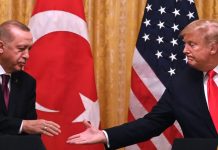While celebrating the fact that Pakistan was not included in the FATF blacklist, a prominent Indian media house claims that Islamabad has exposed itself with the lack of intent to stop terror and is content being in the FTFF grey list.
FATF Black List Next On Cards For ‘Terror Sponsor’ Pakistan?
The Financial Action Task Force, an independent body, that aims to protect the global financial systems, maintains two important lists – A grey list and a blacklist. Countries under the blacklist, according to FATF, are the ones complicit of supporting terror funding and money laundering. Iran and North Korea are the esteemed members of the list who are termed as Non-cooperative countries or territories (NCCTs).
A grey list, however, is not as severe as the blacklist. Countries under the grey list are considered a brewing place of terror funding and money laundering. Pakistan has featured in the list thrice in the last decade.
Being on the grey list means a cut in the sanctions of funds from international institutions like the World Bank and the International Monetary Fund. The countries on the grey list desperately attempt to shut down all its funds to terror organizations to eject itself out of the grey list but Pakistan, unsurprisingly, seems to be content with the grey list and happy to not have been moved to the blacklist.
In a recently concluded FATF meeting, the greylisting of Pakistan was extended to June 2020. Following the development, Shah Mehmood Qureshi, Pakistan’s foreign minister, celebrated the decision for India’s failure to push Pakistan to join North Korea and Iran.
Polio In Pakistan – The Rise And Rise Of Polio Cases In Pakistan
Pakistan continues to feature in the list because of its failure to shut the funding to terror groups like Al-Qaeda, Jaish-e-Mohammad, Lashkar-e-Taiba, and Taliban.
Over the years, despite several countries pushing Pakistan to investigate the illicit actions of their leaders, Pakistan has continued to remain complicit of supporting terrorism. This, perhaps, is because that Pakistan is aware that the countries, like the United States and the United Kingdom, are hesitant to impose strict actions on Islamabad as they see the country as a gateway to Afghanistan and Iran.
The grey list, which currently comprises 12 countries and is formally described as “other monitored jurisdictions” is another matter. Those included in it are constantly reviewed for their actions to stop terror financing and money laundering.
Ideally, from Pakistan’s perspective, coming out of the FATF’s grey list is a no brainer but since it inevitably acts on the demands of the terrorists, Pakistan has been handcuffed into the grey list. A credit that Pakistan deserves is its consistency to be on the edge – to be on the grey list.
Once a country is on the grey list, it is quite smooth in slipping into the blacklist but Pakistan has mastered the game of staying on the edge by periodically acting on terrorism while, most of the time, it cultivates it.
The first country to warn Pakistan, apart from India, was America in 1992 for nurturing terrorism. Pakistan then banned the group Harkat-ul-Ansar (HuA) for kidnapping an American tourist but the group resurfaced with another name – Harkat-l-Mujahideen (HuM).
Why Return of Kashmir Pandits is Nearly Impossible Despite All The Hoopla
It is when a pattern started to emerge. A checklist maintained by Pakistan helps the terrorist group to evade immediate consequences but is not completely terminated. Pakistan’s intent has always been questionable. Its failure to act on the United Nations Security Council’s resolution that directed it to seize assets of people involved in the terror activities that included the likes of Dawood Ibrahim, Hafiz Saeed, and Maulana Masood Azhar.
In 2008, FATF termed Pakistan as a country that posed a high risk of supporting terror funding and placed it on the grey list only to let it go after a few measures. The reason for this might be the political limitations of an institution like the FATF. A similar thing happened in 2012.
Though Pakistan convicted Hafiz Saeed for terror offenses and not for his involvement in the deadly attacks on the city of Mumbai in 2008, it looks like another attempt by Pakistan to evade the blacklisting by the FATF.
Penned By Akarsh Havanur, Opinion By thePrint. Views Personel




